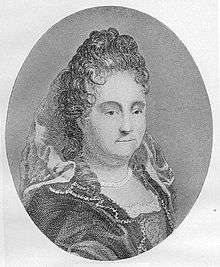Anne Dacier


Anne Le Fèvre Dacier (1654[lower-alpha 1] – 17 August 1720), better known during her lifetime as Madame Dacier, was a French scholar and translator of the classics, including the Iliad and the Odyssey.
Education and editions
Dacier was raised in Saumur, a town in the Loire region of France, and taught both Latin and ancient Greek by her father, Tanneguy Le Fèvre. After he died in 1672, she moved to Paris, carrying with her part of an edition of Callimachus, which she published in 1674.[2] She gained further work through a friend of her father, Pierre-Daniel Huet, who was then assistant tutor to the Dauphin and responsible for the Ad usum Delphini series of editions. He commissioned her to produce editions of: Publius Annius Florus (1674), Dictys Cretensis (1680), Sextus Aurelius Victor (1681) and Eutropius (1683).
Translations
In 1681 appeared her prose version of Anacreon and Sappho, and in the next few years, she published prose versions of Terence and some of the plays of Plautus and Aristophanes. In 1684 she and her husband retired to Castres, with the object of devoting themselves to theological studies. In 1685 the Daciers were rewarded with a pension by Louis XIV of France for their conversion to Roman Catholicism.[3]
In 1699 appeared her prose translation of the Iliad, which earned her the esteem in which she is held in French literature.[2] It was followed nine years later by a similar translation of the Odyssey, which Alexander Pope found useful. Dacier in turn published in 1724 remarks on Pope's translation of the former (1715–20), which gained her some fame in England as well.[4]
Controversy
The Iliad, which made Homer known for the first time to many French men of letters (including Antoine Houdar de la Motte) gave rise to a famous literary controversy. In 1714, La Motte published a poetical version of the Iliad, abridged and altered to suit his own taste, together with a Discours sur Homère, stating the reasons why Homer failed to satisfy his critical taste. Mme. Dacier replied in the same year in her work, Des causes de la corruption du goût.[2] In defending Homer, Dacier "developed her own philosophical aesthetics. She insists on the centrality of taste as an indicator of the level of civilization, both moral and artistic, within a particular culture."[5]
La Motte carried on the discussion with light gaiety and badinage, and had the happiness of seeing his views supported by the abbé Jean Terrasson, who in 1715 produced two volumes entitled Dissertation critique sur L'Iliade, in which he maintained that science and philosophy, and especially the science and philosophy of René Descartes, had so developed the human mind that the poets of the eighteenth century were immeasurably superior to those of ancient Greece.[3]
In the same year, Claude Buffier published Homère en arbitrage, in which he concluded that both parties were really agreed on the essential point that Homer was one of the greatest geniuses the world had seen, and that, as a whole, no other poem could be preferred to his; and, soon after (on 5 April 1716) in the house of Jean-Baptiste de Valincourt, Mme. Dacier and La Motte met at supper, and drank to the health of Homer.[3]
Personal life
She died at the Louvre in 1720.
Notes
- ↑ Sources differ as to the year of her birth. The Encyclopaedia Britannica has 1654; Conley in the Internet Encyclopedia of Philosophy has 1647, and the Catholic Encyclopedia has 1651. The only known portrait of her, dated 1854, has her death at the age of 68,[1] suggesting 1651–52.
References
- ↑ Jean Delisle (1 January 2002). Portraits de traductrices. University of Ottawa Press. p. 14. ISBN 978-2-7603-0546-5.
- 1 2 3 Chisholm 1911.
- 1 2 3
 One or more of the preceding sentences incorporates text from a publication now in the public domain: Chisholm, Hugh, ed. (1911). "Dacier, André s.v. Anne Lefevre". Encyclopædia Britannica. 7 (11th ed.). Cambridge University Press. pp. 727–728. This cites:
One or more of the preceding sentences incorporates text from a publication now in the public domain: Chisholm, Hugh, ed. (1911). "Dacier, André s.v. Anne Lefevre". Encyclopædia Britannica. 7 (11th ed.). Cambridge University Press. pp. 727–728. This cites:
- C. A. Sainte-Beuve, Causeries du lundi, vol. ix.
- J. F. Bodin, Recherches historiques sur la ville de Saumur (1812–1814)
- P. J. Burette, Éloge de Mme Dacier (1721)
- Mémoires de Mme de Staël (1755)
- E. Egger, L'Hellénisme en France, ii. (1869)
- Mémoires de Saint-Simon, iii.
- H. Rigault, Histoire de la querelle des anciens et des modernes (1856).
- ↑ The Feminist Companion to Literature in English, eds Virginia Blain, Patricia Clements and Isobel Grundy (London: Batsford, 1990), p. 259.
- ↑ John J. Conley in Internet Encyclopedia of Philosophy Retrieved 5 December 2015. This provides a thorough account of Dacier's thinking.
Sources
 Lejay, Paul (1908). "André Dacier". In Herbermann, Charles. Catholic Encyclopedia. 4. New York: Robert Appleton Company.
Lejay, Paul (1908). "André Dacier". In Herbermann, Charles. Catholic Encyclopedia. 4. New York: Robert Appleton Company.
External links
- "Anne Dacier". Internet Encyclopedia of Philosophy.
- Anne Dacier in the Encyclopædia Britannica
